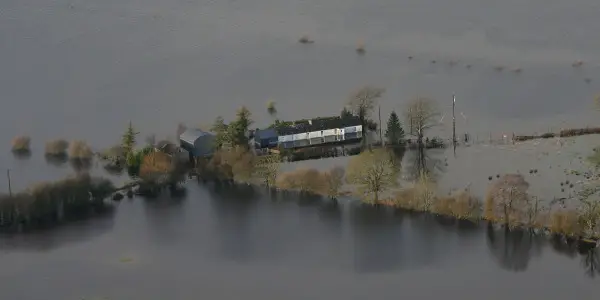Ireland can expect to get hit by near-record wet winters every eight years, a climate expert has warned.
While vast swathes of the west and Midlands remain under water since last December, research by Maynooth University claimed the notion of once-in-100-years weather events will soon be a thing of the past.
The first study of its kind to explore changing seasonal extremes on Ireland’s environment said that extremes will become the new normal.
And while this winter looks set to beat all comers for rainfall, Dr Conor Murphy, of Maynooth’s department of geography, said his climate models show washouts similar to the record set in 1994-95 could hit every eight years.
The research said the likelihood of a record wet winter has doubled since 1850.
“By contextualising climate change relative to extreme weather that people have observed in their own lifetimes, it is our hope that this research will provide a more tangible reference point for a wide range of audiences,” Dr Murphy said.
Alongside international researchers, the team at Maynooth took 150 years of Irish weather records and selected the wettest, stormiest, driest and hottest of years.
The scientists determined how unusual the extremes were and then built experiments to project and scrutinise weather patterns over the next 100 years.
It found t he summer of 1995 was the driest and warmest on record and the chance of a re-run of a lengthy heatwave is now 56 times more likely compared with 1900.
The models also warned that as many as 26 out of the final 30 years of the 21st century are expected to be warmer than the hottest summer on record.
The study said the likelihood of this record-breaking run of increasingly high temperatures is almost 250 times greater than in 1850.
The alarming findings were published in the international journal Climate Risk Management and it aims to advise decision-makers who will ultimately be tasked with adapting to climate change.
The report warned the ramifications are not to be taken lightly.
It said that extremely warm summers will have significant consequences for Irish society as deaths soar alongside temperatures.
It also warned of the significant challenges for water resource management and agriculture, as such conditions have historically resulted in widespread winter flooding and summer drought.
Author Dr Tom Matthews, previously of Maynooth and now at Liverpool John Moores University, added: ” The impetus behind this research was a desire to combat the psychological distancing that is widespread amongst the general public and decision-makers.
“There is an undeniable need for us all to reduce our emissions and plan appropriately for climate change.
“However, there is a common perception that climate change is temporally, geographically or socially distant from people’s lives, and this reduces public engagement with the issue.”
John Lynskey, national sheep chairman of the Irish Farmers’ Association, said the harsh winter has had a severe impact due to the additional costs of feed and meal for ewes and lambs.
